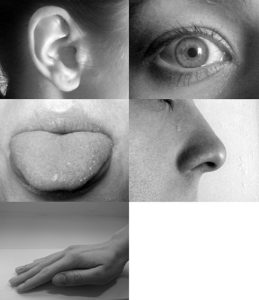Image Credit: Allan-Hermann Pool [CC BY-SA 4.0 Wikimedia
We are lucky enough to have five senses, senses that we take entirely for granted until one of them is lost. Sight, smell, sound, taste, and touch are all essential in our everyday lives. You use at least one of your five senses every moment of every day, and they are on duty even while you are sleeping, working together to let your brain know what is going on around you and helping to keep you safe by warning you of any danger.
As we age, our senses become less heightened and affect how we interpret our surroundings. The loss or depreciation of our senses can cause frustration, lack of self-worth, isolation and possibly lead to injuries from falls. But there are some ways you can avoid some sensory loss and here’s how:
Your Eyes
As you get older, the natural flexibility of the lens in your eye can change and become more rigid making it difficult to see things up close. To try and protect your eyesight you should do the following:
Firstly, avoid eye strain as best as possible. Avoid eye strain by performing tasks in proper lighting and limiting time spent looking at anything for an extended period – up close or far away. If you are reading, take frequent breaks and look off to the distance to give your eyes a break, or sit quietly and close your eyes for a minute or two and give your entire body a quick break. Make sure you protect your eyes by wearing sunglasses if you are going out in the sun and if you have prescription glasses, wear them.
Your eyes also need proper nutrition. Omega-3 fatty acids, and vitamins C and E can promote eye health as well as eating citrus fruits, green leafy vegetables which are high in lutein, nuts, and fatty fish which will all help keep your eyes healthy. You should also avoid smoking and monitor your general health as high blood pressure, and diabetes can be detrimental to eye health. Also, make sure you have your eyes checked once a year or with any significant change in vision.
It would help if you visited an eye doctor for added peace of mind even if you don’t have any discernible difference in your vision.
An eye doctor can also let you know if you’re likely to experience any vision changes in the near future, such as due to the aging process or because of a medical condition.
If you do have glasses already then make sure you look after them, use a glasses necklace to limit the chances of losing them, and clean glasses regularly too.
Your Ears
There are several reasons why you might lose your hearing as you age, Presbycusis is the name of the gradual loss of hearing as you age, but overexposure to noise for an extended period of time, viral or bacterial infection, a heart condition, stroke, head injury or tumor and medication side effects can also be detrimental to your hearing.
To protect your ears, you should see an audiologist as soon as you notice any sign of hearing loss or pain (my bachelor’s degree is in audiology!). You should also watch your nutritional intake as a healthy diet is essential for your hearing as well. Limit any exposure to loud noise as once the small hair cells in your ears are destroyed they cannot be replaced.
In the event of hearing loss, you can consider such as hearing devices, make sure that you inform other people of your hearing loss and ask them to face you, to speak clearly and use expression and gestures when they engage you in conversation, also minimize background noise.
Taste And Smell
There are many reasons why your senses of taste and smell as both can diminish with age because of your taste buds and nerves in the nose degenerate. It can also be down to nasal sinus conditions, allergies, poor dental hygiene, side effects from medication or neurological diseases like Alzheimer’s or Parkinson’s. As these changes occur with your sense of smell and taste, your appetite can wane – which is not great as again proper nutrition is essential. To combat this, it is important to be social and to eat with someone, try different flavors, watch your salt intake, avoid smoking, limit your alcohol intake with meals, drink more water and exercise.
Touch
It might be hard to imagine, but changes in our skin and nervous system also occur and may decrease our sensitivity with our sense of touch. This again can be due to poor nutrition, circulatory issues, skin and nerve damage, brain disorders, side effects of medication, smoking and sun damage. You can minimize these changes with the same self-care as mentioned for the other senses, proper nutrition and exercise, and also good skin care.
The changes in our five senses can influence our balance, pain threshold, the ability to notice temperature changes, and sense of motion and pressure, so it’s important to adapt as they happen and attend to the changes in our bodies.
Thank you for reading!


